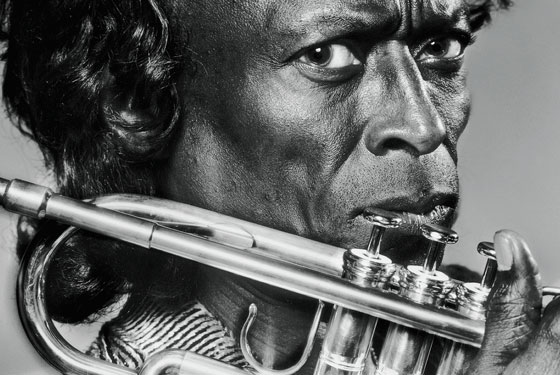
Here it is, the ultimate boxed set, a completist’s wet dream that makes the recent Beatles trove (thirteen CDs, in mono and stereo) seem a piddle by comparison. Miles Davis: The Complete Columbia Album Collection, Sony’s stab at the gargantuan-reissue sweepstakes, consists of 70 CDs, comprising all 52 albums that the dark prince of jazz trumpet laid down for Columbia Records over a 30-year span, plus the customary array of alternate takes and previously unissued tracks (available only from Amazon for $364.98, just over five bucks per disc). What makes this truly valuable, and not just another marketing trick to squeeze more money from a dead jazzman, is that Miles Davis was a perpetual pioneer who transformed the music four or five times in the course of his career. And so these discs lay out the evolution not only of Miles Davis but of modern jazz itself.
The saga wends its way from a Paris concert in 1949, when Miles was still tethered to the syncopated rhythms of bebop, which he’d mastered as a sideman to its inventor, Charlie Parker; to his mid-fifties studio sessions, when he put a Harmon mute on his trumpet bell and bathed standards and show tunes in a golden glow; to his collaborations with Gil Evans, Porgy and Bess and Miles Ahead, which shifted orchestral jazz from swing to cool; to the best-selling Kind of Blue, where he abandoned bebop’s foundations, improvising not on chord changes but on scales, allowing more focus on melody and mood than on rhythm and speed; on into the sixties, when he loosened the music’s structure further, adding a jangled, almost free-form intensity; and, finally, to the electric jazz-rock fusion of Bitches Brew and Dark Magus, an era that gradually devolved into a mechanical rut but reemerged at the end, in 1985, with Aura, a jolting synthesis of jazz, rock, and Messiaen-influenced classical music that lit up a future path lamentably unfollowed.
Remarkably, through all these changes, Miles himself remains distinctly Miles: the plangent tone, the insouciant expressiveness, the darting melodic twists, like the lines of a Miró painting. He was the first jazz musician since the original pioneer, Louis Armstrong, to construct a compelling public persona to match his music—though where “Pops” began his as a boisterous showman in the days of segregation, Miles formed his as a brooding sorcerer on the cusp of black assertiveness.
Davis was also one of the savviest talent scouts of jazz, and so these albums showcase, in his sidemen, the early development—in some cases the first glitterings—of subsequent leaders, most notably John Coltrane, Bill Evans, Wayne Shorter, Herbie Hancock, Tony Williams, Ron Carter, Keith Jarrett, Chick Corea, and Jack DeJohnette. Perhaps most poignantly, the box holds a bonus DVD, previously unreleased, of two concerts in Europe in 1967. It features his most innovative quintet: Hancock, Shorter, Williams, and Carter. They are all so young and dashing, and, you wonder, can anyone, ever again, be so hair-raisingly cool?
Miles Davis: The Complete Columbia Album Collection
Sony.
$364.98.